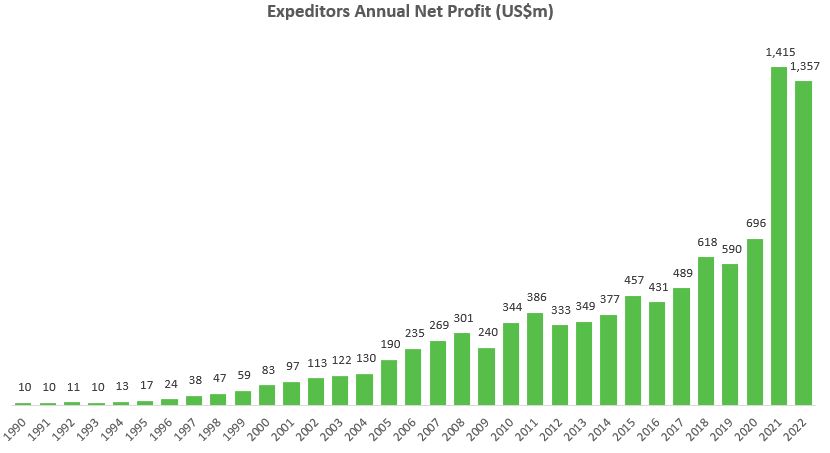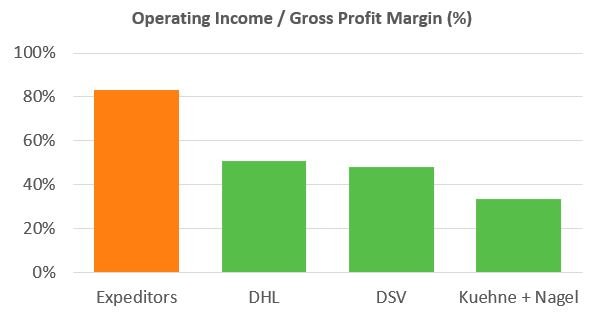
Introduction:
In 1979, a small freight forwarder known as Expeditors was founded in Seattle with a single office. Despite its humble beginnings, Expeditors would go on to achieve tremendous profit growth over the next few decades and emerge as the best-in-class player in the global freight forwarding industry. Their achievement is nothing short of extraordinary – they grew net profit by almost 140x from US$9.7m in 1990 to US$1.3b in 2022!
In this article, our logistics industry experts will explore Expeditors’ remarkable success story and draw lessons on key success factors that small freight forwarders can adopt to maximize their business potential.
Expeditors’ History:
Expeditors’ journey to becoming a leading global freight forwarder is truly impressive. Since 1990, the company has experienced remarkable growth, growing profits by 17% per annum.
 Source: Expeditors company annual reports
Source: Expeditors company annual reports
Expeditors expanded its service offerings from ocean freight forwarding to a full suite of global logistics services as it grew. These services now encompass airfreight, ocean freight, customs brokerage, warehousing, and distribution services. Moreover, their project cargo unit provides specialized delivery solutions across multiple transportation modes, catering to items of unique size or nature that require dedicated attention.
Lessons from Expeditors: 6 Key Success Factors
So, what lessons can we learn from the world’s best-in-class freight forwarder, given their remarkable achievements? We believe there are six key success factors that all freight forwarders, regardless of their size, can learn from Expeditors:
1. Carving Out a Niche Market:
Expeditors pursued a highly focused strategy. Initially, they concentrated on carving out a niche trade lane by specializing in exports from the Far East to America, rather than competing with larger forwarders in Europe or other developed markets.
As a result, Expeditors was strategically well-positioned to benefit when China joined the World Trade Organization in 2001 and became the world’s manufacturing hub. The global trade accelerated as China exported goods like electronics, textiles, and machinery to the US.
By focusing on their niche trade lane, Expeditors established expertise in China-US trade and forged strong relationships with their customers in the US. They were able to differentiate themselves and capture a significant market share with fewer competitors serving this emerging market.
2. Leveraging Strong Network Effect
Moreover, as they grew and scaled up their operations globally, Expeditors’ extensive volume and geographical coverage led to a strong network effect, which created a strong competitive edge against its peers:
- By consolidating growing volumes from its shippers, Expeditors will become more valuable as a freight forwarding partner to the transportation carriers.
- In turn, Expeditors can negotiate better freight rates and terms for their shippers and customers.
- Better terms will then attract even more customers to use Expeditors services, which will then lead to greater freight volumes and stronger bargaining power vis-à-vis the transportation carriers.
As a result, this virtuous cycle helps to strengthen their competitive position continuously against smaller competitors and accelerate their business growth.
3. Fostering a Unique Culture
Expeditors’ unique culture also played a significant role in their success. In the freight forwarding industry, the company is well-regarded for their unique incentive plan and decentralized operating model.
From its early days, they implemented a generous profit-sharing bonus system based on branch-level operating income. This created a highly motivating and results-oriented environment with many benefits:
- As bonuses are rewarded based on branch performance, it promotes accountability and autonomy for local employees. Therefore, it incentivizes them to go above and beyond in driving exceptional customer service and overall business performance.
- Fostering a strong team culture as bonuses are tied to the branch’s financial performance and not only individual performance.
- Motivating employees to drive sustainable business growth rather than maximizing short-term revenue as bonuses are tied to operating profits and not just net revenue.
- Creating financial robustness during downturns, as a large proportion of operating costs is linked to staff expenses which are now variable and tied to profit performance.
- Attracting top talent to join the company as the bonus amount can be very rewarding during good times.
- Encouraging staff retention as employees will feel a sense of belonging by being “part owners” of their branches.
While some companies may be reluctant to give high employee bonuses given the potential pressure on profits, it is worth highlighting that Expeditors has delivered superior profit margins vs. its competitors despite higher staff compensation due to greater operating efficiency:

*Profit margin is calculated using gross profit as denominator due to different revenue recognition policy
Source: Company annual reports, analysis by One Logis
4. Embracing Non Asset-Based Strategy
Furthermore, Expeditors’ commitment to a non asset-based model was a crucial factor in their rapid scalability. By remaining focused on their core strength of freight forwarding and not venturing into contract logistics in a big way, they were able to expand faster and invest resources in areas that truly differentiated them in the market.
Most of Expeditors’ competitors will provide warehousing and distribution services via contract logistics model. As rental cost is a large component of operating expenses for contract logistics business, most competitors will resort to owning warehouse assets to increase their competitiveness in the market.
However, warehouse assets ownership requires significant investments that will tie up capital inefficiently as they grow.
5. Building Deep Expertise in Customs Brokerage
Additionally, Expeditors developed a strong customs brokerage business, utilizing their local networks to penetrate new countries and expand their scale. This strategic advantage allowed them to navigate complex customs regulations and provide seamless logistics solutions to their customers.
Developing a strong customs brokerage franchise requires significant investment, time, and effort:
• Building local teams and relationships with customs authorities.
• Developing understanding and staying up to date with various evolving regulations.
• Obtaining necessary licenses.
• Leveraging technology to facilitate electronic documentation.
As a result, Expeditors’ freight forwarding services are becoming more attractive for shippers that need to access broader markets due to its superior customs brokerage offering.
6. Harnessing Power of Technology with Logistics Software
Lastly, underpinning Expeditors’ success is their relentless focus on technology adoption. By leveraging advanced digital solutions, they enhanced operational efficiency, visibility, and customer experience.
By digitizing their operations with a logistics software system, they were able to maximize their operating efficiency in several ways:
• Automate shipping documentation and reduce time and errors associated with manual paperwork.
• Streamline order, quotation and invoicing process to increase processing speed.
• Manage relationships with multiple carriers.
• Achieve real-time visibility and logistics tracking of their shipment.
• Enhance decisions with timely and accurate analysis and reporting of financial performance. This allowed them to implement their unique branch-level bonus plan for all employees.
Conclusion:
Expeditors International’s journey to becoming the best-in-class freight forwarder globally offers invaluable lessons for businesses in the logistics industry.
In summary, their relentless focus on carving out a niche, leveraging network effects, fostering a unique culture, embracing an asset-light model, building strong customs brokerage capabilities, and harnessing the power of technology has been the key to their commercial success.
Underpinning their success is a strong and reliable logistics software. One Logis offers several logistics software solutions in Singapore and Asia. If you are a freight forwarder, discover how you can harness technology like Expeditors to maximize your business potential by booking a free demo today!